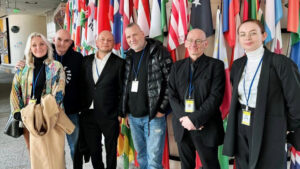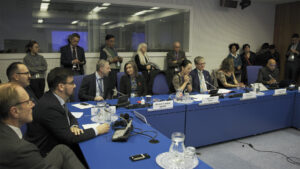HumanRights360, a human rights NGO, in partnership with STEPS, a harm reduction NGO, started a new program to provide legal help to people who live on streets in Athens. We interviewed Emmanouela Soldatou, the research and advocacy coordinator of STEPS about this new initiative.
Drugreporter: Can you tell me more about the Street Lawyering program? What is the concept and how does it work in reality?
Emmanouela Soldatou: A lawyer accompanies a team of our street-workers on foot (becomes a street-worker per se), from place to place, in the most degraded neighbourhoods of Athens, where we meet the most vulnerable and excluded populations. Three evenings per week Katerina Pournara (our lawyer) approaches and offers her services to all those who need them. During the morning hours, she researches and handles their cases or demands and returns her findings or regulations. The target is to provide legal support and advice (depending on each specific need) to those that have no hope of accessing them through traditional routes.
Where did the idea come from to create a Street Lawyer program in Athens? Were you inspired by other programs in other countries?
I dare to say that first comes the paradigm of the Danish Street Lawyers – Gadejuristen. Their work is truly inspiring, and their programme became a profound aspiration of Tassos (STEPS’ founder). Being constantly present on the streets of Athens with outreach programmes, we really felt that lack of appropriate information and legal support may even stand as the vicious point keeping these people trapped on the street and/or on self-harming behaviours. Accordingly and sincerely, we needed to accept that no matter our will and training the legal aid cannot but come from a lawyer.
Under this scope, we first planned it a couple of years ago with the lawyer Chara Papageorgiou, but it did not materialise then. The right moment arrived some months ago when HumanRights360 heard our idea, and believed in its power and potential. They moved exceptionally fast so that in under five months we were able to realise our vision.
The police are notoriously violent in Greece, especially with drug users and sex workers. How do they tolerate the presence of the street workers? Is there any cooperation?
Cooperation? No, I could not say that. Quite the opposite indeed. They keep obscuring our work. They interrupt a session with the lawyer to relocate the individuals or they research our beneficiaries right after we leave – to get information or threaten them to minimise their contacts with us. I think the worst case was once they performed a physical examination to our street-workers and checked our van. It was unexpected and offensive. So, police remain to conserve the classic face of power and repression and each time we look for ways to overcome it/them.

To how many and what kind of people have you provided legal services since the program was started?
During September (the first month of the programme) we have supported 39 individuals and 43 unique cases. The target population is street-connected people and as you understand each of them carry various identities. They may use psychoactive substances problematically, be sex workers, refugees-migrants or natives, women or men, parents or singles, and so on. Their common denominator is vulnerability, exclusion, pauperisation, and little to no access to services (health, welfare, advice etc).
What are the main reasons people ask your help for? Can you resolve these problems?
So far, most want to know if any criminal decision or court is pending for them. For these requests, our lawyer is authorised to get all the information and return it to them. One-third of the beneficiaries (most of them asylum seekers, immigrants, and refugees) asked for help with their documents (which may be stolen, delayed, or they have no information on procedures and rights). Other cases concerned access to healthcare and welfare services, eviction, and debt settlements. In these, we gave information on the procedure for civil cases (divorce etc) and the possibility of free legal aid. Lastly, two cases were reported to the Racist Violence Recording Network.
Until now, we have been able to address all of the requests and bring back information or amendments. Let me clarify, that we can ‘resolve’ on the scope we promised we will – more of a first-level legal aid. We explain to the beneficiaries in the first place that we cannot represent them in front of the court but we can help them know their rights. We give them information on how to ask for free legal aid and we provide them with the necessary documents.
Individual legal support is useful but has limited impact. Do you advocate for system-wide reforms? What needs to be changed in the laws and policies?
Advocacy has been on our agenda from the beginning. Because we believe in the power of sharing and exchanging information (in various forms), we did not want to stay only in the field. In that framework, we have already met with the scientific advisor of IONIS (shelter for homeless drug users) and accordingly we are planning meetings with other pivotal stakeholders and those responsible at the municipality level. Moreover, as the project moves, we intend to make it visible both nationally and internationally, share good practices, and push for reforms. The overall goal is of course to push for systemic change, so that all street-connected people have unhindered access to legal aid through public structures – as it should be in the first place. These are the advocacy actions made on the scope of this project. ‘STEPS’ also runs advocacy actions on a greater range of issues.
Concerning the second part of your question, I would start from the implementation of the existing laws. A clear case in point is that since March 2019 in Greece, we can have Supervised Injection Sites, yet no move has taken place towards their installation. Secondly, we would ask for an explicit legal framework concerning Harm Reduction practices. Imagine that clean syringe distribution is neither legal nor illegal. It moves in a grey zone. Last but not least, we firmly believe that the decriminalisation of use would tremendously support a more inclusive society, where all could at least ask for help without fearing prosecution.
How do you see the effects of the current COVID-19 crisis on people who live on the streets of Athens?
At first, they are indeed really exposed and unprotected to COVID-19. If these people were once deemed unseen, dangerous, and as untouchables, you can imagine how the existence of the virus affects them. They have very little access to public water services (keep in mind that there are just two public taps in Athens), they have no information on current evolutions and applicable ‘rules of conduct’, and they lost references once many outreach activities of other organisations and institutions halted. Of course, access to public health services is all the more difficult (to all citizens) due to the stress that the COVID-19 emergency has placed on hospitals.
Secondly, they face extra stigmatisation (as possibly exposed to the virus and unprotected) and can be victims of arbitrary decisions. Let me mention here, that once the confinement was put in place in Greece, the municipality of Athens launched – in a considerably short time – two new shelters for homeless people (one for drug-users and one for non-drug users and only for Greek or documented citizens). It is indeed a major step. However, we are starting to worry since reading the new announcement of the municipality. It describes that healthy homeless drug-users will be ‘shortly’ (no precision) confined (with their will or without it) in a new shelter – on the excuse of virus protection – along with other virus-infected vulnerable citizens. If this happens, we will be talking about significant human rights abuses.
Interview by Peter Sarosi





